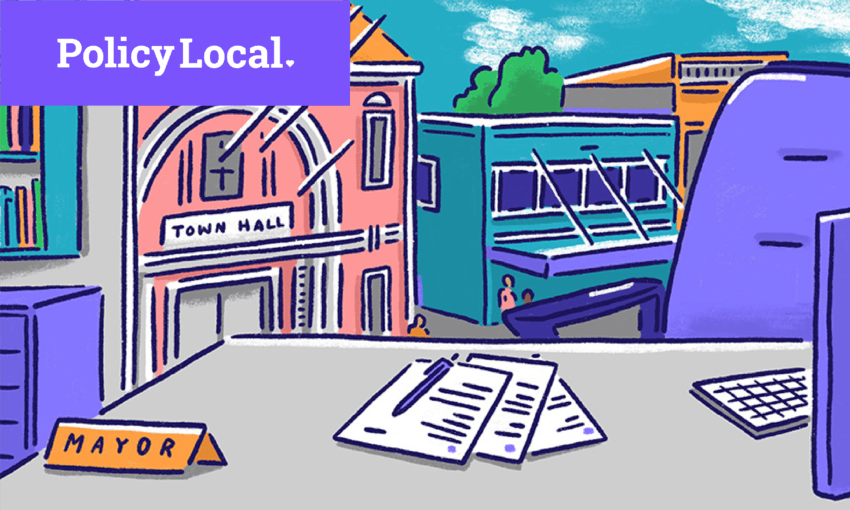Boomers versus zoomers, the great uncontested swathes, and what makes Greymouth special.
Policy Local was made possible thanks to Google News Initiative, Meredith Connell, Spinoff Members and Jenny Sutton.
With the votes now counted for the local elections, the team behind the candidate comparison super-tool, Policy Local, looks back on some of the more interesting things they learned from covering every single local body election in the country, from the Northland Regional Council to the Southern DHB.
There’s a hell of a lot of elections
The number is 572. That’s 572 different elections that we said we’d cover without knowing if it was possible, spanning high-profile races like the Auckland mayoralty down to NZ’s least populated council, the Chatham Islands. All up that makes for over 3,600 candidacies: people running for office who we needed to survey to find out where they stood on the key issues.
Local government is hopelessly fragmented
Number of candidates aside, the biggest challenge to making Policy Local was the insane fragmentation of local election information. Each council is responsible for running its own election, and they can change electoral boundaries pretty much as they please. There’s also no centralised maps showing all local election boundaries. Not only does this make projects like Policy Local hard, we suspect it harms turnout, as most councils have very limited resources for engaging and educating voters.
Nearly one in five elections was uncontested
With 101 elections uncontested, 235 candidates strolled into office without being voted on, raising a few eyebrows about the health of the democratic process. This included the mayors of Whangānui, Gore, Rangitīkei and Clutha.
Southland had a hard time finding people to stand for election
Not only were 36 seats uncontested in Southland District, in 15 elections there weren’t even enough candidates to fill the positions available. In two of those elections – Murupara Community Board (Galatea-Waiohau Subdivision) and Oreti Community Board (Makarewa Subdivision) – no candidates stood at all. Sad!
Climate change was a bigger focus than rates
There’s a stereotype that all local government candidates care about is rates, rates and rates, but candidates mentioned climate change more frequently in their top three priorities on Policy Local than rates. In light of the wave of councils declaring climate emergencies around the country, this further suggests that local government is becoming a focal point for those trying to tackle the climate crisis.
A bunch of zoomers stood for election but boomers still dominate
Thirteen candidates who provided their age to Policy Local (some didn’t) said they were in their teens, nine of whom were 18, the rest 19. But 118 candidates said they were aged over 70 – and the true numbers, taking into account those who never completed our survey, are almost certainly a lot higher.
A lot of business people ran for office
Of the candidates who participated in Policy Local, the most common former occupation was ‘Businessperson’ (101), followed by ‘Business Owner’ (40). The self-employed (26), farmers (21), and students (16) rounded out the top five.
The most informed voters were from … Greymouth
Users of Policy Local were keen to dive deep into the details, with one in four spending more than 10 minutes exploring the candidates and their policies. But it was the locals of Greymouth who spent the longest time on average using the tool, while Motueka voters spent the least time.
Candidates had some interesting – albeit unorthodox – policy ideas
We asked candidates for their policies on around 10 topics (depending on the election) and the responses varied from the unsurprising (no new rates!) to the totally bewildering. Here’s a random selection of some of the more intriguing proposals we saw:
“Lead by example. Adopt a horse.”
“The need for more poop bag stations on the olive grove side of the river is urgent as there is dog poop everywhere along the path.”
“Just buried my old dog. Always picked up her waste while walking, picked up a lot of other people’s rubbish too. Make noise, use bins.”
“Assist with a solution for the seagull problem affecting the Main Street.”
“Teach people to become breatharians” (we had to look it up)
“Money is entirely fictional, we don’t have to use it if it is no longer fit for purpose.”
Roughly one in 20 voters used Policy Local
More than 63,000 people from more than 50 cities and towns visited Policy Local. And 45 percent were from outside Auckland and Wellington. Fortunately, Policy Local’s still online so it’s not too late to dive in to find out a bit more about who the hell you’ve elected to represent you.
Policy Local wouldn’t have been possible without the generous support of our sponsors. Our lead sponsors were Google News Initiative and Meredith Connell, and we also received support from the Spinoff Members Fund and Jenny Sutton. Thank you all for seeing the value in this project and helping us strengthen local democracy.
For the 2020 general election, Policy will be back and bigger than ever. If you’d like to come on board as a supporter, email us at contact@policy.nz


